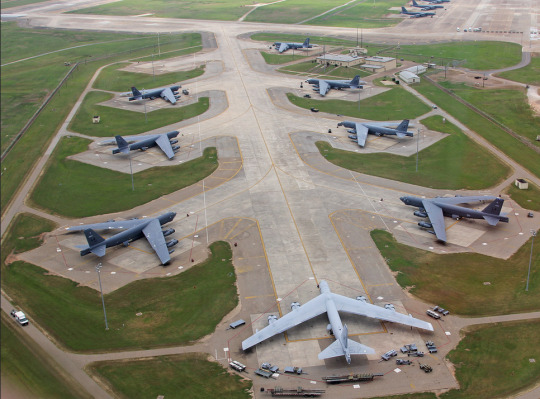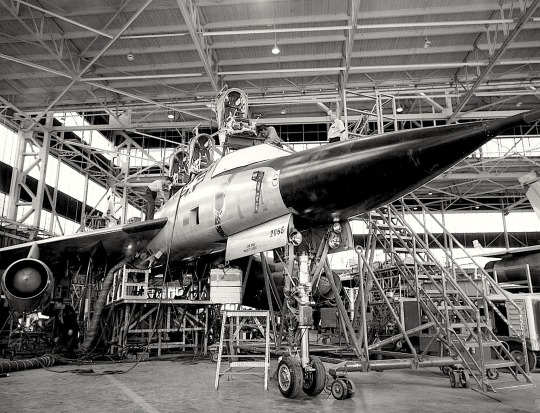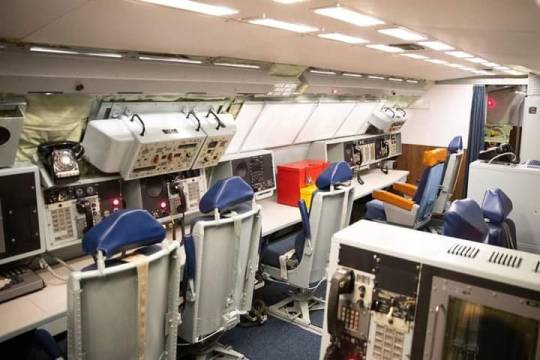#Strategic Air Command
Explore tagged Tumblr posts
Text

The Convair B-58 Hustler “Shackbuster” and crew.
#vintage airplane#vintage aircraft#b 58#b-58#convair b-58 hustler#convair b 58 hustler#military aircraft#military aviation#aviation#bombers#b-58 hustler#b 58 hustler#military bombers#cold war era#u.s. military#stratofortress#nuclear bombers#jet bombers#usaf#u.s. air force#air force#strategic air command#sac#supersonic bombers#convair#strategic bomber
217 notes
·
View notes
Text

"Christmas Tree"
#USAF#SAC#Strategic Air Command#Christmas Tree#Barksdale AFB#Alert Ramp#Boeing#B-52#Stratofortress#Bomber#military#cold war
206 notes
·
View notes
Text

Beyond just a slogan — SAC: A force for peace. 🕊️
@RealAirPower1 via X

23 notes
·
View notes
Text

#air force#bomber#us air force#fighter plane#jets#spy plane#fighter pilot#military planes#airmen#planes#airforce#airplane#army air corps#fighter jet#fighter jets#jet engines#formation flight#fighter#sac#strategic air command#curtis lemay
21 notes
·
View notes
Video
SR-71-Blackbird-Cutaway1 by James Vaughan
#James Vaughan Photo#sac#propaganda#populuxe#nuclear#kiloton#atomic#airtoair#aircraft#aerospace#atomic airplane#atomic annihilation#hydrogen bomb#atomic bomb#Strategic Air Command#Department Energy#nuclear deterent#world war 3#flickr
2 notes
·
View notes
Text

On the occasion of the first B-36s to visit Great Britain, B-36D, 49-2658 is displayed for the press at RAF Lakenheath, Suffolk, January 17th 1951
19 notes
·
View notes
Text

#us air force#bomber#us space force#fighter plane#jets#united states air force#usaaf#us armed forces#us air base#us army air corps#Strategic Air Command
19 notes
·
View notes
Link
The article discusses the Convair NB-36H, a nuclear-powered bomber developed during the Cold War by the United States Air Force and the Atomic Energy Commission. Post-World War II, nuclear power was seen as a miracle energy source, leading to its consideration for military applications beyond submarines and supercarriers, like bombers. The NB-36H was a modified Convair B-36 Peacemaker, equipped with an air-cooled nuclear reactor, although the reactor never powered the aircraft in flight. Despite extensive research, including 47 test flights, the program was deemed too costly and risky, ultimately scrapped, as missile advancements reduced the need for such bombers. This endeavor reflects Cold War era technological ambitions and challenges in nuclear propulsion development.
#Convair NB-36H#nuclear-powered bomber#United States Air Force#nuclear propulsion#Convair B-36 Peacemaker#General Electric#reactor#Fort Worth#Strategic Air Command#Winged reactor#Project MX-1589#Texas#Project NICK#Los Alamos National Laboratory#Albuquerque#New Mexico#nuclear reactor incinerator#flight tests#atomic energy#Cold War#Air Force Special Weapons Center#nuclear research.
0 notes
Text
Convair B-58 Hustler.

312 notes
·
View notes
Text

The Convair B-58 Hustler.
#vintage airplane#vintage aircraft#b 58#b-58#convair b-58 hustler#convair b 58 hustler#military aircraft#military aviation#aviation#bombers#b-58 hustler#b 58 hustler#military bombers#cold war era#u.s. military#stratofortress#nuclear bombers#jet bombers#usaf#u.s. air force#air force#strategic air command#sac#supersonic bombers#convair#strategic bomber
114 notes
·
View notes
Text
Just added to Etsy
~ "The Winged Armada: The Story of the Strategic Air Command" by Martin Caidin (1964) First Edition
#THe winged armada#strategic air command#martin caidin#first edition#first edition book#first edition books#vintagecdchyld#vintage books#vintage book seller#book seller#vintage etsy#vintage etsy seller#etsy seller#vintage#books for sale#vintage books for sale#books books books#etsy
0 notes
Text

When my Dad, Richard “Butch” Sheffield, was flying the B-47, he volunteered for a brand new airplane called the B-58. He lost his spot promotion and had to go back to being a lieutenant. He writes about it in a book he left for his family. I am sharing this for the first time today.
I entered the B-58 Combat Crew Training School (CCTS) as a student. The school was about two months long with academics and simulators. I was crewed with Captain Sparks (Sparky), aircraft Commander (AC), and Lt. Patrick, Defense Systems Officer (DSO).
We soon started flying, and I loved the B-58. The bombing and navigation system, plus the cockpit, were excellent. We became combat-ready fast and were one of the first crews checked out in the aircraft, number fourteen, I believe.
CENTRAL EVALUATION GROUP (CEG)
General LeMay wanted all SAC crews to be changeable. Each crew and crew position was to have procedures alike for the aircraft they were flying in. The Central Evaluations Group (CEG) visited each wing and tested and evaluated the crew force to see if all wings performed the same procedures. To pass CEG was a big deal in B-47’s.
The first B-58 crew to go through CEG
The CEG people wanted to get their foot in the door on this new program, so they decided that they should come in and give a check ride to one of the crews. We were selected.
It was a joke; they didn’t know anything about the aircraft, but they went through the motions and checked us; it was a piece of cake; we passed. So, we became the first B-58 crew ever to pass CEG.
-The first pilot quits, stalls over Dallas
About six months after we became combat-ready, we flew a Mach 2 bomb run on Dallas at night. When the run was over, and we went to start our descent from fifty thousand feet, Capt. Sparks pulled back the power but FORGOT to take the altitude hold off.
The aircraft went into a nose-high stall, and we began to drop quickly; the engine’s compressor stalled, and the generators all went offline. We lost all electrical power; I had only a tiny battery-powered light in the cockpit. The only thing I could see was the airspeed and altimeter. I called the pilot, who said the flight controls had locked up.
It took one hundred and fifteen pounds of pressure to override the autopilot. He was a petite guy trying to override it, not knowing that altitude hold was on. It was a wild ride down. We were falling tail first with very little forward motion.
I decided to eject at fifteen thousand feet as we were trained. At about twenty thousand feet, I felt the nose of the aircraft starting to drop, and he said, I think I have got it (he had overridden the autopilot). Once the nose came down, the engines could be re-started, and we recovered at about ten thousand feet; we landed at Carswell. No one said a thing.
The following day, when I went into the Squadron, everyone was saying, did you hear about “Sparky?” I said no. They said he went into the commander (CO) office this morning and threw his wings on his desk, and said, “I quit!” He then went around the Squadron bad-mouthing the B-58 and telling the other crews they should quit the program, too, because the aircraft was unsafe; the CO told him to get out.
Someone recently asked if I had any B-58 stories, so I saved this beautiful picture of a B-58 and found the story in my dad‘s book. Dad stayed with the B-58s until he was hired away to the SR 71 program in 1964. He had to pass the astronaut physical at Brooks, Air Force Base, Texas and then he arrived at Beale Air Force Base in 1965.~Linda Sheffield
@Habubrats71 via X

23 notes
·
View notes
Text
Upcoming Title...Fall 2023?

View On WordPress
#America Through Time#B-36 Peacemaker#B-52 Stratofortress#Fonthill Publishing#loring afb#nuclear history#nuclear weapons#strategic air command
0 notes
Video
1953 ... old-school subs soldier on! by James Vaughan
#James Vaughan Photo#sac#propaganda#populuxe#nuclear#kiloton#atomic#airtoair#aircraft#aerospace#atomic airplane#atomic annihilation#hydrogen bomb#atomic bomb#Strategic Air Command#Department Energy#nuclear deterent#world war 3#flickr
1 note
·
View note
Text

#us air force#bomber#us space force#fighter plane#jets#united states air force#usaaf#us armed forces#us air base#us army air corps#strategic air command
3 notes
·
View notes
Text

went outside and saw no less than 3-4 people I had catastrophic high school beef with/have slept with/have tried to sleep with me
#WHAT IS IN THE FUCKING AIR#I GOT MY PERIOD TOO#offically going into hiding#appointing lena the temporary caravel nation commander while i strategize#shut up karou
2 notes
·
View notes